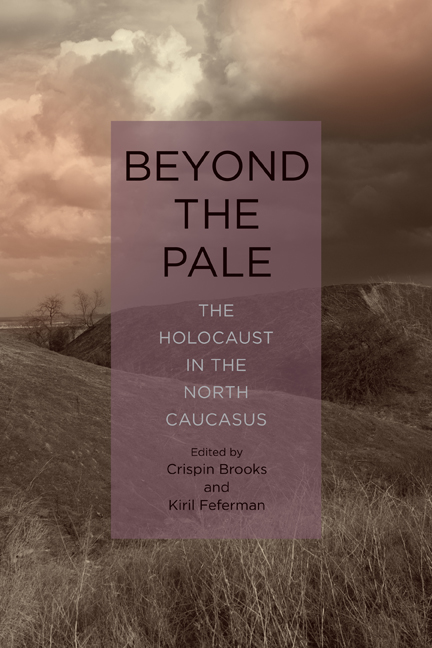Book contents
- Frontmatter
- Contents
- List of Illustrations
- Acknowledgments
- List of Abbreviations
- Note on Terminology
- Introduction
- 1 The Caucasus: A Rock in the Grinding Wheels of World History
- 2 Dwelling at the Foot of a Volcano? Jewish Perspectives on the Holocaust in the North Caucasus
- 3 “Operation Blue,” Einsatzgruppe D, and the Genocide in the Caucasus
- 4 The Kaukasier Kompanie (“Caucasian Company”): Soviet Ethnic Minorities, Collaborators, and Mass Killers
- 5 Mass Executions in Krasnodar Krai: Cross-Checking Sources for the Holocaust in the North Caucasus
- 6 In the Shadow of “Mass Treason”: The Holocaust in the Karachai Region
- 7 Rescue and Jewish-Muslim Relations in the North Caucasus
- 8 “We Were Saved Because the Occupation Lasted Only Six Months”: (Self-)Reflection on Survival Strategies during the Holocaust in the North Caucasus
- 9 The Holocaust on Soviet Territory—Forgotten Story? Individual and Official Memorialization of the Holocaust in Rostov-on-Don
- Glossary
- Bibliography
- List of Contributors
- Index
6 - In the Shadow of “Mass Treason”: The Holocaust in the Karachai Region
Published online by Cambridge University Press: 06 October 2020
- Frontmatter
- Contents
- List of Illustrations
- Acknowledgments
- List of Abbreviations
- Note on Terminology
- Introduction
- 1 The Caucasus: A Rock in the Grinding Wheels of World History
- 2 Dwelling at the Foot of a Volcano? Jewish Perspectives on the Holocaust in the North Caucasus
- 3 “Operation Blue,” Einsatzgruppe D, and the Genocide in the Caucasus
- 4 The Kaukasier Kompanie (“Caucasian Company”): Soviet Ethnic Minorities, Collaborators, and Mass Killers
- 5 Mass Executions in Krasnodar Krai: Cross-Checking Sources for the Holocaust in the North Caucasus
- 6 In the Shadow of “Mass Treason”: The Holocaust in the Karachai Region
- 7 Rescue and Jewish-Muslim Relations in the North Caucasus
- 8 “We Were Saved Because the Occupation Lasted Only Six Months”: (Self-)Reflection on Survival Strategies during the Holocaust in the North Caucasus
- 9 The Holocaust on Soviet Territory—Forgotten Story? Individual and Official Memorialization of the Holocaust in Rostov-on-Don
- Glossary
- Bibliography
- List of Contributors
- Index
Summary
It was August 1942. Traveling desperately for two weeks by horse and cart, Leonid Zozovskii's family made a last-ditch attempt to escape the approaching Germans on an unforgiving mountain road in the Karachai region of the North Caucasus:
You could hear rifle and machine-gun fire as we were going along the road…. Some people overtook us. A car went by with some soldiers in it. But I remember we’d been told the day before we had to get through the mountains. Carts wouldn't make it, so we had to load up the horses. Somehow we were supposed to get through with the horses all loaded up. A total fantasy—why we went on, I don't know…. It started getting dark. We didn't come to a dead end. The mountains were simply too steep and the horses stopped. We tried to goad them on with some food, some hay, but they refused to go any further. So there we were in the middle of the road—on one side a river, on the other mountains— and that's where we stopped.
The German advance reached the region on the 13th–14th of the month. A week later, a unit of the “Edelweiss” division dramatically placed the Nazi flag on top of Elbrus, considered the highest mountain in Europe, and by early September the Germans had captured all the major passes of the northwest Caucasus Mountains. Hastily formed Soviet partisan groups assisted the Red Army's retreat, but, poorly coordinated and supplied, they were soon destroyed by the Germans with the help of collaborating local militias. By late September, however, the German advance had stalled because of supply problems and fuel shortages, the arrival of Soviet reinforcements, and the onset of winter, which rendered the mountain roads impassable. By the same token, the refugees were also stuck, only a few miles from safety.
As brief background of this historical region, Karachai is located in the mountains and valleys northwest of Mount Elbrus. Today it is part of Karachaevo-Cherkessia—a constituent republic of Russia, bordering Georgia to the south. In 1942, the area was known as the Karachai autonomous oblast, an ethnoterritorial region of the Soviet Union designated by the authorities for its indigenous people, the Karachais.
- Type
- Chapter
- Information
- Beyond the PaleThe Holocaust in the North Caucasus, pp. 145 - 183Publisher: Boydell & BrewerPrint publication year: 2020

